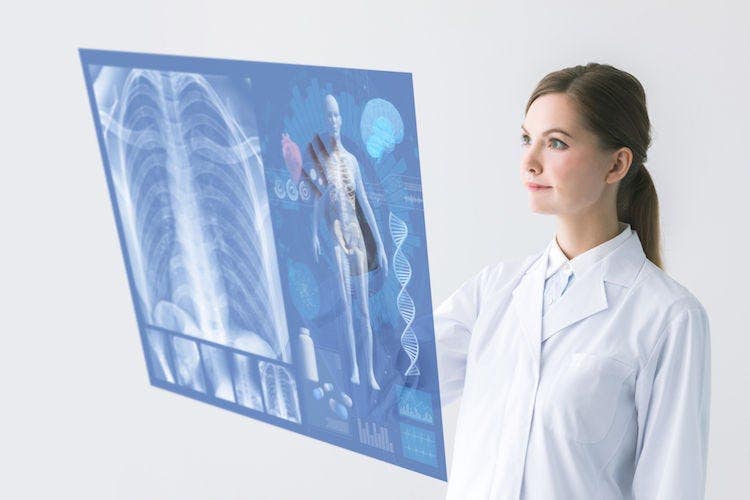The Future of Nursing: Leading Change in the 21st Century

The nursing profession is undergoing a period of rapid growth and change. The U.S. Bureau of Labor Statistics (BLS) expects the number of nursing jobs to grow by more than 400,000 from 2016 to 2026. This increase of 15% is double the national average for all jobs. If you’re excited by the prospect of entering the nursing field, this trend indicates increased opportunities to secure a rewarding career.
The newest generation of nurses is experiencing changes to the field so they can build upon the traditional skills of providing high-quality patient care, performing various medical tasks, and assisting doctors. While these abilities remain vital, exciting technological advancements and increased access to care for traditionally underserved populations give nurses the opportunity to adapt and provide more immediate, personalized care.
The future of nursing depends on experienced nurses taking a leadership role to train incoming generations, a community-based approach to care, and a focus on demographic shifts amidst a market that is facing a shortage of primary and specialty care doctors. Earning an MSN degree online can be a decisive step toward attaining such a position.
Millennials Entering the Healthcare Workforce
Millennials, defined by Pew Research Center as adults born between 1981 and 1996, will be leading much of the near-future growth in the nursing industry. According to an article in HealthExec, which cites a study by Health Affairs, millennials are twice as likely as baby boomers to become nurses.
With the Pew Research Center reporting more than 10,000 boomers retiring each day, this influx of millennials will support the continued stability of the medical field. In 2017, the New York Post drew on data from the BLS to report that both emergency medical technicians (EMTs) and physician assistants were among the top 10 industries dominated by millennials; each had more than 38% of its workforce belonging to that generation.
Further, those nurses are increasingly educated — a Pew Research study in 2018 found that while only 15% of men born between 1925 and 1942 attended some college, 29% of millennial men opt for post-secondary education, and 46% of millennial women have earned a bachelor’s degree. This implies those who pursue a career in nursing will likely secure higher education than in the past.
As more millennials enter the workforce as nurses, they will find themselves in an exciting position. With new technology and advanced medical procedures to leverage, such as biomedical devices, robot-assisted surgeries, stem cell research, and more, the future of nursing offers an opportunity for nurses to become leaders in this evolving field. In addition, a solid education will provide the foundational skills they need to succeed, and the experience of their mentors will help ease the transition the nursing field will face in the coming decades.
Community Health Leaders
An advanced nursing degree could support you on the journey to a leadership role that impacts the greater community. The modern world of nursing strives to serve more traditionally under-reached populations. These initiatives can provide an opportunity to work in a variety of nursing roles, including nurse practitioner, nurse specialist, nursing supervisor, and more.
As community health leaders, nurses must understand the impact of their care, not just on an individual basis, but for the public as a whole. They should know what medical resources are available in the area where they live and practice, and its specific medical challenges. With this knowledge, they can take proactive steps to prepare for community health issues, allowing them to better serve their patients instead of reacting to problems as they arise. In addition, their expertise influences other local medical professionals as well as the population at large.
Opportunities to take on the role as a community health leader continue to grow. Nurse practitioners, for example, may anticipate 31% more jobs between 2016 and 2026 according to the BLS — double the rate of nursing overall. This increase in highly educated, specialized nursing positions indicates an opportunity for the future of nursing to provide a far higher level of care with patients.
Expanded Scope of Practice
As the generational and technological landscape of the nursing profession continues to change, so too will the profession itself. This means expanded opportunities for nurses to see patients, provide more personalized care, and perform advanced duties based on their specific area of expertise. For example, a nurse who specializes in pediatrics will be better equipped to provide care to young children.
Those nurses new to the field will increasingly rely on medical technology. For example, nurses now utilize devices that scan a patient’s body functions, such as glucose levels and cardiovascular health, which improves the effectiveness and efficiency of patient care. In addition, these advancements allow healthcare professionals to monitor patients in settings outside of hospitals. Pop-up clinics, mobile units that travel within areas lacking services offer quality preventive medical care.
While the future of nursing features increasingly advanced technology, the intuitive care of nurses remains vital. Future healthcare professionals, who can take advantage of robust patient data and apply their own knowledge and wisdom, will remain invaluable members of their community and help drive medical improvements.
Become a Leader in the Future of Nursing
Sources
AAMC, New research shows increasing physician shortages in both primary and specialty care
American Nurse Today, “Emerging trends in nursing”
Forbes, “It’s Time To Expand Scope of Practice Laws”
HealthExec, “Millennials will dominate the nursing profession by 2020”
Maryville University, Career Opportunities for MSN Graduates
New York Post, “This is the Most Millennial-Dominated Job in the US”
Pew Research, “Baby Boomers Retire”
Pew Research, “Defining generations: Where Millennials end and Generation Z begins”
Pew Research, “How Millennials Compare With Their Grandparents 50 Years Ago”
Pew Research, “Today’s young workers are more likely than ever to have a bachelor’s degree”
Robert Wood Johnson Foundation, “How Nurses Are Caring for Their Communities”